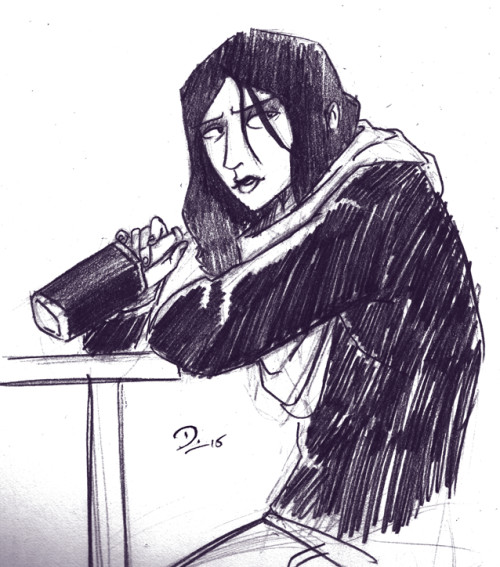Sketch Fridays #09 – Jessica Jones
Jessica Jones, the latest product of the Marvel and Netflix team-up, has only been available for a few weeks and has, just as quickly, fostered its share of discussion both of the binge-watching, water cooler variety as well as more academic and/or socially conscious discourse. I don’t have much to stand on as of yet as I have not actually finished watching the thirteen episodes (as of this writing, Nicole and I have only watched eight), but even with a mere 60% of available episodes under my belt I have strong feelings about what has been brought to not only the Marvel Cinematic Universe, but to Netflix and to television (as much as it is actually television, which is debatable).
I hesitate to start lobbing superlatives around because, as informed and objective as I think I am being, it’s hard to really parse out what aspect of these feelings are genuine, deep-seated, thoughtful response and what is hyperbolic reaction simply because it’s new and different. For once, it’s absolutely true to say this: only time will tell. Despite that, I think Jessica Jones is a rather important text––more important than any other Marvel cinematic entry so far (movie, television, or digital)––because it is actually using the superhero genre not only as a narrative framework for a fascinating and original story, but it is also using superpowers as a powerful and meaningful metaphor and allegory.
What Jessica Jones is doing differently from all other Marvel properties (and DC, as well) is that it is transcending its super-heroic roots, baggage, and narrative (though it uses all of those very well and pushes that general genre forward) and became art. It is the epitome of what Art, or Literature, or Cinema does and becomes a vessel for a time and a place, for a people and a struggle––a voice screaming at the top of its lungs but is so well-crafted you could miss it if you don’t listen. Jessica Jones is a subversive commentary dressed as a hard boiled detective story using superhero, comic book language, and it is beautiful.
It embodies a concept I have discussed before but like to reintroduce when I can because it had such a profound effect on me as an artist and human being. While taking a “Great Books” class during my undergraduate education, we were reading various examples of Roman poetry/philosophy (such distinctions were undefined back then; a concept whose return I wouldn’t mind in many ways) and I came across Horace. He coined a concept that––more than any other codified theory or book about writing––made so much sense to me that it changed the way I looked at art, like putting on glasses for the first time and seeing the linework (so to speak) in the surrounding world. Horace argued that all art (including anything that can fit under that umbrella) should embody the principle of dulce et utile; that is, art should be “sweet and useful.” It should be entertaining––popularly so––but even the most aesthetically-minded of reader would walk away with a piece of some universal truth that may surface at any time and make that person’s life better. Art should inform how we live our lives, not just be an escape from it. Art should be a tool that unites ideas and knowledge like a hammer or screw.
Batting between being the best and worst praise for the Marvel cinematic content is that it’s “popcorn” or “blockbuster” or “stupid fun.” While that’s fine, for some––I hate to say it––that may be all they are: links in a chain.
Jessica Jones is not particularly fun. It’s brutal and heartbreaking and horrifying and scary. It’s not for binging. It’s for processing. It’s about the mystery of the main character and rooting for her to avoid a tragic hero’s fate, but it’s also about what she has gone through, metaphorically and literally, and a safe place to discuss those ideas and their cultural implications.
I speak in the abstract because I want to discuss no details; it’s best to see those with your own glasses on rather than having someone tell you about it anyway. Also, I’m not done with the show.
While predictions of the show’s impact are futile and possibly colored by its immediate praise or cultural trending, I honestly feel that what Jessica Jones is doing for live action superhero drama is what The Dark Knight Returns or Watchmen did for comic books. It’s saying something very, very important about our culture while breaking and bending the tropes of the genre it’s using. It’s not perfect, but that’s what makes it perfect for discussion.
I can’t stop thinking about the show; it swirls in my mind like a perfect song while simultaneously haunting me like a nightmare. For that, today’s sketch was more catharsis as it was an exercise. I can’t necessarily recommend the show, but when you think you’re ready for it you should definitely give it a chance. Just don’t expect it to do what Avengers or even Daredevil did for you. As with the character herself, Jessica Jones needs to walk its own path.


Discussion ¬